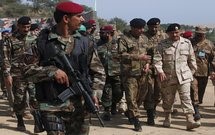 Pakistan Army’s tacit support to the protestors in the ongoing protests at Islamabad has created the atmosphere for political instability and renewed the threat of another army coup.
Pakistan Army’s tacit support to the protestors in the ongoing protests at Islamabad has created the atmosphere for political instability and renewed the threat of another army coup.
The supporters of Imran Khan and Muhammad Tahir-ul-Qadri have marched to the Red Zone, the high security area in Islamabad and have been demanding Prime Minister Nawaz Sharif’s resignation alleging large scale rigging in last year's general elections. The breaking down of barriers by the supporters and their entry into the high security zone seem to have been facilitated by the security forces as the police took token measures to halt the protestors and later retreated to avoid violence. The moving in of Pakistan Army units for the security of the red zone seemed to indicate to the world of the seriousness of the protest and also reiterate Pakistan Army’s role as the sole custodian of Pakistan’s stability.
The timings of the protest seem to have been well exploited by the army establishment. Pakistan Army has faced unprecedented questioning of its role in country’s affairs in the recent past. Its role as an omnipotent institution has been openly discussed and challenged in many forums and debates. Its ability to tackle terrorism has been under scrutiny due to brazen actions of TTP, like killing of two army officers in suicide attack in Rawalpindi in June 2014 and attack on Karachi airport. The Musharraf episode and rise of Nawaz Sharif, who has had a number of run-ins with the army establishment in the past seemed to have shaken Pakistan Army’s stranglehold on country’s polity. The army needed an opportunity to re-affirm its hold on Pakistan’s affairs and the present protests seem to have provided that opportunity.
Nawaz Sharif’s participation in Prime Minister Narender Modi’s swearing in ceremony was seen as a step his quest towards normalisation of relations with India, the very anti-thesis for Pakistani army establishment. The announcement of secretary level talks in August 2014 between the two countries was another pointer towards improving relations. The planned escalation of firing incidents along LC and in Jammu region, inviting the separatist leaders for talks showed the army’s intent to systematically impair any attempts towards better relations between both countries.
The present protests have once again re-positioned Pakistan Army as the sole savior of Pakistani state. Given the protest leaders intentions of demanding resignation of Nawaz Sharif’s government, the country seems to be headed towards another political crisis with two possible outcomes. First, both groups would work out a face saving compromise where both come out as victors and token concessions or re-elections may take place in few constituencies. The second outcome may be dismissal or forced resignation of Nawaz Shairf government to be replaced by a caretaker government till further modalities are worked out. This will place Pakistan Army in its usual role of power broker within the country.
The unfolding of the situation is along predictable lines. Pakistan Army has always destablised and marganilised the political establishment when its stake is threatened. It has once again used its resources to weaken the political establishment and wean away the political parties to suit its self interests. The very existence of Pakistani Army hinges on its anti India tirade. Pakistan Army’s aim would be to focus the attention away from Pakistan’s domestic issues by creating an atmosphere of uncertainty.
Options for India: The India policy will always be laid down by the Pakistan Army. Hence, a stable civilian government or an era of political instability will not have any effect in its actions against India. An escalation of firing incidents along the border combined with LC violations and inflammatory anti-India speeches can be expected in the coming days. This is an expected status quo and Indian army is well geared to thwart any such intent. Pakistan Army must realize the domestic turmoil due to terrorism and fiscal deficiencies; rising insurgency threat and present political instability bring the country one step closer to the failed state position. The greater challenge is Pakistan’s own rising vulnerabilities and not perceived Indian threat.
Indian policy makers have to except the reality that Indian policy of self restraint has not led to any tangible results as far as Pakistan is concerned. Pakistan Army’s anti-India obsession will not let any improvement in relations to take place due to inherent insecurities. India may have to opt for a hard line approach in its policy towards Pakistan and formulate a well thought out action plan. The time has come to talk tough and reply a bullet with two bullets. Pakistan must well remember that Indian actions once led to its dismemberment. It must keep in mind that Indian security forces and political resolve have the competence to accomplish that action a second time.
By Special Arrangement with The Centre For Land Warfare Studies (CLAWS) (http://www.claws.in)